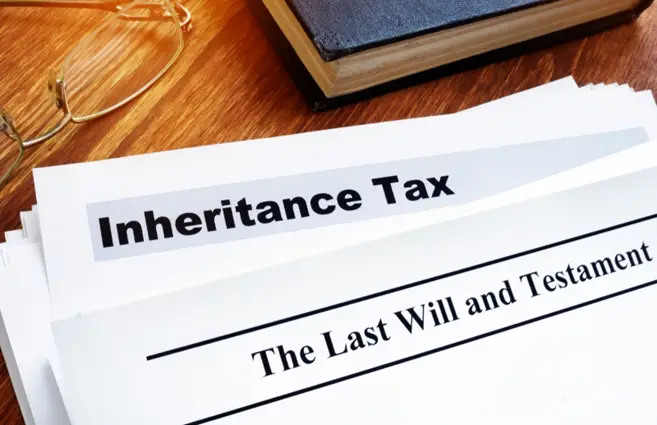
FLORIDA INHERITANCE TAX
Are you prepared to be hit with an astronomical amount of taxes on your inheritance? Well, fear not, because the state of Florida has a surprise for you.
Florida’s inheritance tax is notorious for its exorbitant rates that can leave beneficiaries and heirs reeling. But before you start panicking, let’s take a closer look at what this tax entails and how it might affect you.
Stay tuned, as we uncover the ins and outs of Florida’s inheritance tax and explore strategies to minimize its impact.
Key Takeaways
– Florida does not have a state-level inheritance tax.
– Beneficiaries and heirs generally do not have to pay taxes on their inheritance in Florida.
– However, larger estates may still be subject to federal estate taxes.
– It is important to consult with a tax professional to understand the specific tax implications for your situation.
WHAT BENEFICIARIES & HEIRS NEED TO KNOW | INHERITANCE

If you’re a beneficiary or heir in Florida, there are important things you need to know about inheritance. First, let’s talk about intestate succession. This refers to the distribution of assets when a person dies without a valid will. In Florida, if there’s no will, the state’s laws determine how the assets will be divided among the heirs.
Next, let’s discuss estate tax exemptions. In Florida, there’s no state-level inheritance tax. This means that beneficiaries and heirs generally don’t have to worry about paying taxes on their inheritance. However, it’s important to note that federal estate taxes may still apply for larger estates.
Now, let’s move on to the probate process. When someone passes away, their estate goes through probate, which is the legal process of administering the estate. This process involves validating the will, paying off debts, and distributing the assets to the beneficiaries.
As a beneficiary or heir, it’s also important to understand the responsibilities of the executor. The executor is responsible for managing the estate, including paying off debts, filing taxes, and distributing assets according to the will or intestate succession laws.
Lastly, let’s talk about the distribution of assets. Once the debts and taxes have been paid, the assets will be distributed to the beneficiaries or heirs according to the will or intestate succession laws.
BENEFICIARIES AND HEIRS
As a beneficiary or heir in Florida, it’s important to understand that the title to real estate may pass to a surviving property owner. This means that if you’re inheriting a property, it may already have a surviving owner who’ll continue to hold the title. It’s crucial to consult with a legal professional to navigate the complexities of this situation and ensure your rights are protected.
TITLE TO REAL ESTATE MAY PASS TO A SURVIVING PROPERTY OWNER

When a property owner passes away, the title to their real estate may be transferred to a surviving property owner, such as a spouse or child. There are a few ways this can happen. One option is joint tenancy, where multiple owners share equal rights to the property, and when one owner dies, their share automatically transfers to the surviving owner(s).
Another option is transfer on death, where the property owner designates a specific person to inherit the property upon their death. Survivorship rights also come into play, allowing the surviving owner to automatically inherit the property. In community property states, all assets acquired during the marriage are considered jointly owned, and upon one spouse’s death, the surviving spouse inherits their share.
If there’s no will or estate plan in place, the property may pass to heirs through intestate succession laws.
BENEFICIARIES OF TRUST
Beneficiaries of a trust receive the assets or property held in the trust according to the terms and conditions set forth by the trustor. As a beneficiary, you play an important role in the trust administration process. It’s essential to understand the tax implications that may arise from receiving trust assets. Depending on the type of trust and the value of the assets, you may be subject to federal and state inheritance taxes. It’s crucial to consult with a tax professional to ensure compliance with tax laws and to minimize any potential tax liabilities.
The distribution process of trust assets is typically guided by the trust document. The trustee, who’s responsible for managing the trust, will oversee the distribution to beneficiaries. They’ve a duty to act in your best interests and follow the instructions of the trustor. The trustee must also fulfill their responsibilities, such as keeping accurate records, providing regular accountings, and making prudent investment decisions.
Once all the assets have been distributed, the trust will come to a termination. This could be triggered by various events specified in the trust document, such as the death of the trustor or the attainment of a specific age by the beneficiaries. At this point, the trust will be dissolved, and any remaining assets will be distributed according to the trust provisions.
Being a beneficiary of a trust comes with rights and responsibilities. It’s crucial to familiarize yourself with the terms of the trust, understand the tax implications, and communicate effectively with the trustee to ensure a smooth and successful trust administration process.
DISINHERITANCE
If you have been excluded from receiving any inheritance from a trust, it’s important to understand the concept of disinheritance and its implications.
Disinheritance refers to the act of intentionally excluding someone from receiving any assets or property upon the death of the grantor. Each state has its own disinheritance laws that determine who can be disinherited and how it can be done. In Florida, for example, it’s possible to disinherit family members, including children and grandchildren, as well as spouses.
However, it’s important to note that disinheriting a spouse may have legal consequences and could potentially be challenged in court.
Disinheritance can have significant consequences for both the disinherited individual and the remaining family members. Emotions can run high, leading to strained relationships and family disputes. It’s important to carefully consider the potential consequences before taking steps to disinherit someone.
To legally disinherit a family member or spouse, proper legal steps must be followed. These may include creating a valid will or trust that clearly states the intentions of the grantor, seeking legal advice, and ensuring that all legal requirements are met.
It’s crucial to consult with an experienced estate planning attorney to navigate these complex legal processes and ensure that your wishes are carried out effectively.
RIGHTS OF ADOPTED CHILDREN
Now let’s explore the rights of adopted children in the context of inheritance and disinheritance situations.
Adoption rights are an important aspect to consider when it comes to inheritance. When a child is legally adopted, they gain the same rights as biological children in terms of inheritance. This means that they have the right to inherit from their adoptive parents just like any other biological child would.
The legal process of adoption ensures that the adopted child is treated as a legal member of the adoptive family. This means that they have the same legal rights and responsibilities as any biological child. The emotional impact of adoption can vary from child to child, but it’s important to recognize that adopted children often develop strong bonds with their adoptive parents and consider them as their true family.
It is also worth noting that adoption doesn’t sever the rights of birth parents entirely. In some cases, birth parents may still have certain legal rights, such as the right to make decisions regarding medical treatment or education. However, when it comes to inheritance, the rights of adopted children supersede those of birth parents.
FLORIDA WILL AND TRUSTS NO CONTEST CLAUSE

The Florida will and trusts no contest clause can provide added security and protection for the intentions of the testator. A no contest clause, also known as an in terrorem clause, is a provision in a will or revocable trust that disinherits any beneficiary who contests the validity of the document. This clause is an effective deterrent against will contests and probate litigation, as it puts beneficiaries at risk of losing their inheritance if they challenge the document.
In Florida, will contests and probate litigation can arise due to various reasons, such as allegations of undue influence or lack of testamentary capacity. The no contest clause acts as a safeguard, discouraging beneficiaries from pursuing such challenges without valid grounds. By disinheriting those who contest the will or trust, the testator’s wishes are upheld, and the assets are distributed according to their intended distribution.
It’s important to note that the enforceability of a no contest clause depends on the specific laws of each state. In Florida, the courts generally uphold these clauses unless the challenger can prove by clear and convincing evidence that there were reasonable grounds for contesting the document.
Frequently Asked Questions
What Are the Current Tax Rates for Florida Inheritance Tax?
You’ll want to know the current tax rates, exemptions, and exclusions, if non-residents are subject to it, how it differs from federal tax, and the filing requirements and procedures.
Are There Any Exemptions or Exclusions to the Florida Inheritance Tax?
You may be wondering if there are any exemptions or exclusions to the Florida inheritance tax. Well, let me tell you that there are certain provisions that can exempt you from this tax.
Can a Non-Resident of Florida Be Subject to the State's Inheritance Tax?
If you’re a non-resident of Florida, you may be subject to the state’s inheritance tax. Out of state beneficiaries could potentially face foreign inheritance tax or non-resident estate tax, depending on the taxation of inherited property and interstate inheritance tax laws.
How Does the Florida Inheritance Tax Differ from Federal Estate Tax?
When comparing the Florida inheritance tax to the federal estate tax, it’s important to consider the inheritance tax implications, Florida inheritance laws, federal estate tax exemptions, and estate planning strategies.
Are There Any Specific Requirements or Procedures for Filing an Inheritance Tax Return in Florida?
To file an inheritance tax return in Florida, you must meet specific requirements and follow certain procedures. These include understanding the tax rates, exemptions, and exclusions, as well as any differences from the federal estate tax. Additionally, non-resident taxes may apply.
Conclusion
In conclusion, beneficiaries and heirs in Florida should be aware of the state’s inheritance tax laws and regulations.
It’s important to understand the rights of adopted children and the implications of disinheriting individuals.
Additionally, having a will and trust with a no contest clause can provide added protection and clarity for beneficiaries.
Being informed and prepared can help ensure a smooth inheritance process in Florida.
Dedicated Probate Experts
Our specialized team possesses deep expertise in the probate sector. We navigate the complexities of the Probate Court with ease and work in tandem with probate lawyers to facilitate seamless transactions. Our comprehensive services are designed to meticulously handle every detail, tailoring solutions to the unique requirements of estate, conservatorship, or trust real estate sales.
We cater to a diverse clientele, many of whom reside beyond Broward County and even outside Florida. Our ability to provide exceptional service remotely means that in-person meetings are often unnecessary, ensuring convenience and efficiency for all our clients.
Real Estate Broker | REALTOR®
Albert Asensio is a licensed Florida Real Estate Broker with a certification in probate and trust sales, embodying a core belief that every client deserves 100% honesty and transparency. Since January 2000, Albert has led a successful real estate business, earning a reputation for speaking sincerely and is proficient within his profession. As a Broker Associate at Lokation Realty, he leverages his specialized probate team to streamline the probate process, alleviating stress for executors and beneficiaries alike, ensuring estate management adheres to legal standards, and safeguarding the interests of all parties involved.

